A heat pump is an excellent solution for cooling and heating your home. Typically, a heat pump is installed outside the house, just like a typical air conditioner. When it is cold, a heat pump absorbs the hot air from your home, leaving it cool. On the other hand, it takes the cool air from outside into your house to cool it when it is warm.
Heat pumps have gained popularity in many states within the United States due to their efficiency and cost-effectiveness. Besides being effective for heating and cooling, you can use a heat pump to heat water in your building. However, it would be best to consider some key factors before installing a heat pump in your home, depending on your location.
Key Takeaways
– A heat pump works for air conditioning by using a reversed refrigeration cycle. Coils in the air conditioner absorb heat from the indoor air, which is then transferred to the outdoor air. This process repeats until the desired temperature is reached. However, on hot days, the heat pump may struggle to keep up, resulting in a sweaty and uncomfortable home.
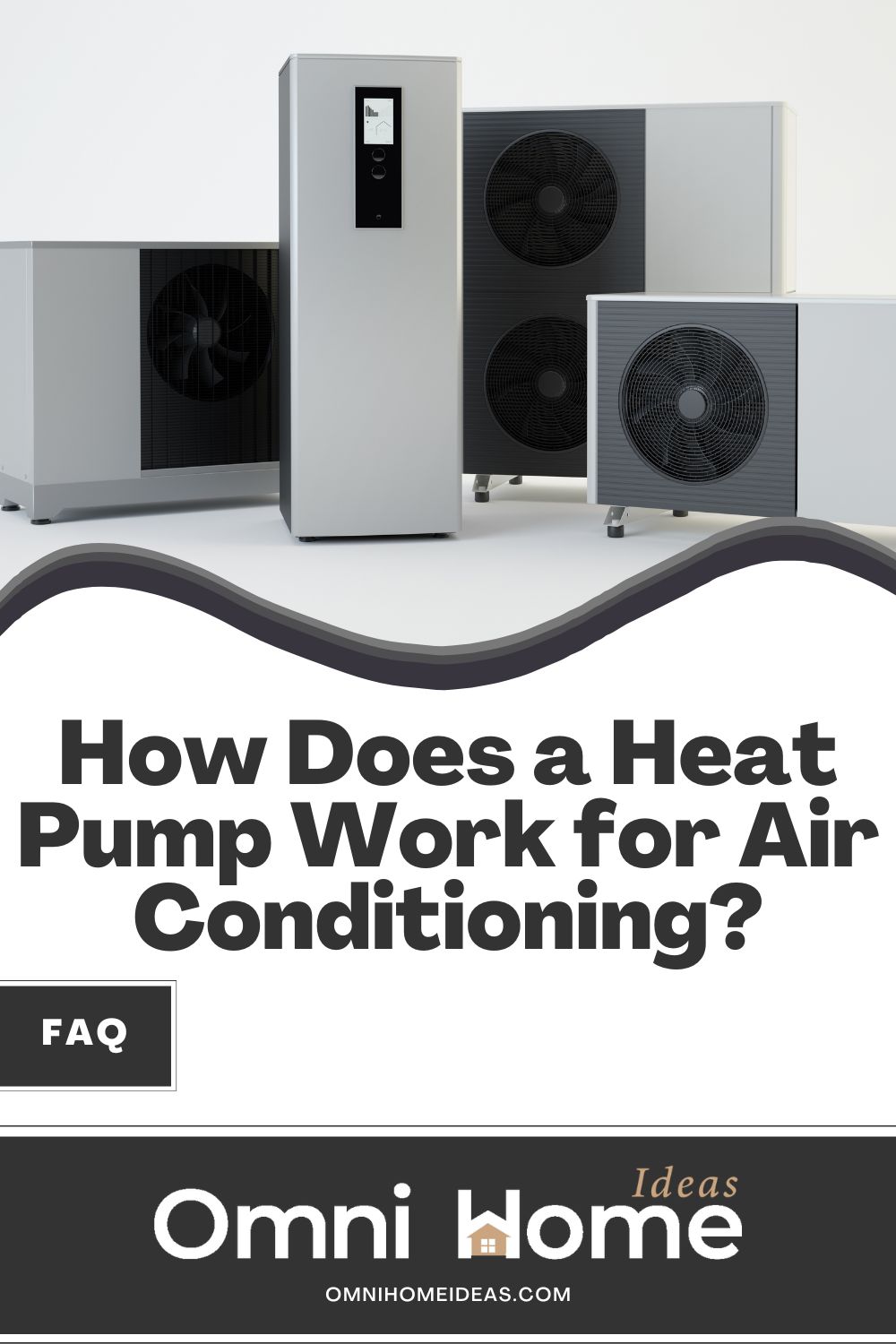
How Does a Heat Pump Work Step by Step
Naturally, heat energy moves to areas with little pressure and low temperatures. It is this physical property that a heat pump uses to transfer either the heat or cool energy.
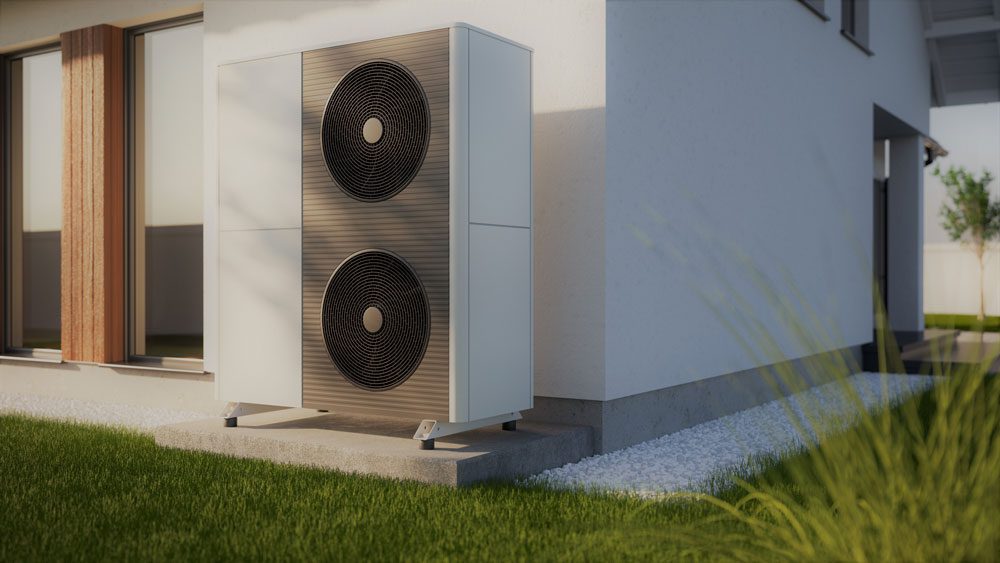
Here is how it works:
Cooling (in summer)
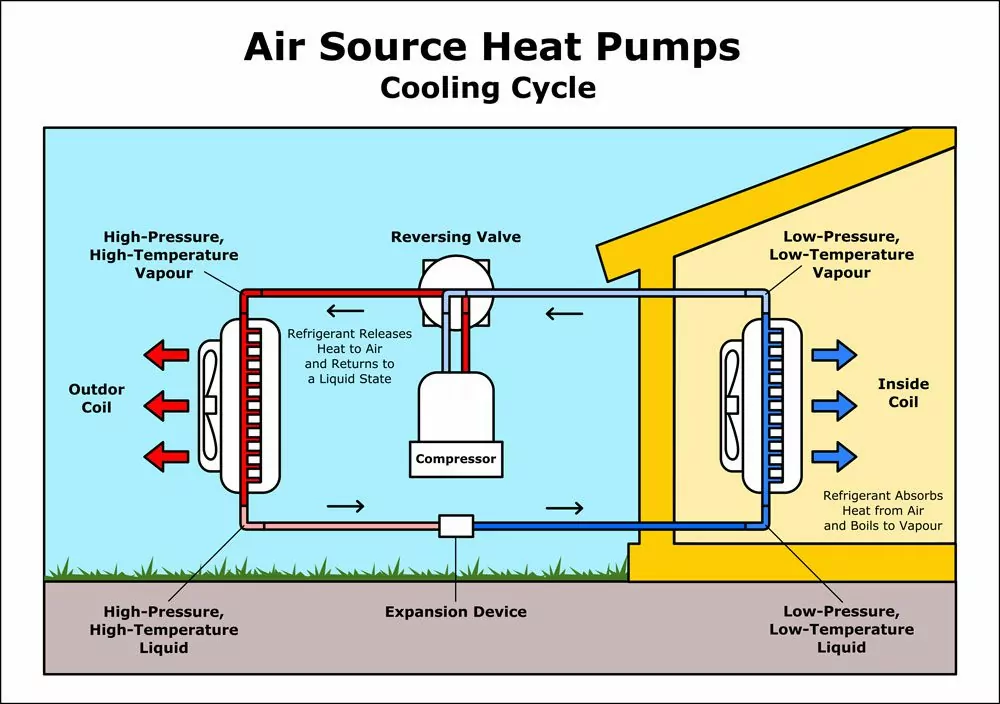
During the warm season, you need to have your house cool to enjoy staying indoors. For this to happen, a heat pump uses these steps:
Step 1: A heat pump system has a liquid refrigerant pumped through an evaporator at the indoor coil. When air from your house goes through the loops, the refrigerant absorbs the heat energy, and the cool air enters the house. As a result, the liquid refrigerant heats up and evaporates into a gas.
Step 2: The gas then passes through a compressor, which pressurizes it, heating it. The heated and pressurized refrigerant then passes through the system and coils that lead to the outdoor unit.
Step 3: A fan at the outside unit of a heat pump blows outside air through the condenser coils. Since hot air is attracted to areas with lower temperatures, the heated refrigerant is compressed, and the heat is released outside, where the air is cooler. The process results in the refrigerant cooling and condensing into a liquid. This liquid refrigerant then goes to the indoor units through an expansion valve.
Step 4: The expansion valve cools the warm refrigerant by reducing its pressure. The cooled and liquidated refrigerant can now be pumped to the evaporator coils to restart the process in the indoor unit.
Heating (in winter)
When warming, the heat pump follows the same steps as when cooling. However, the reversing valve reverses the refrigerant’s flow. As a result, the heating source is the heat energy pumped inside your house, making it warm. Additionally, the outside coils function as evaporators while the indoor coil acts as the condenser.
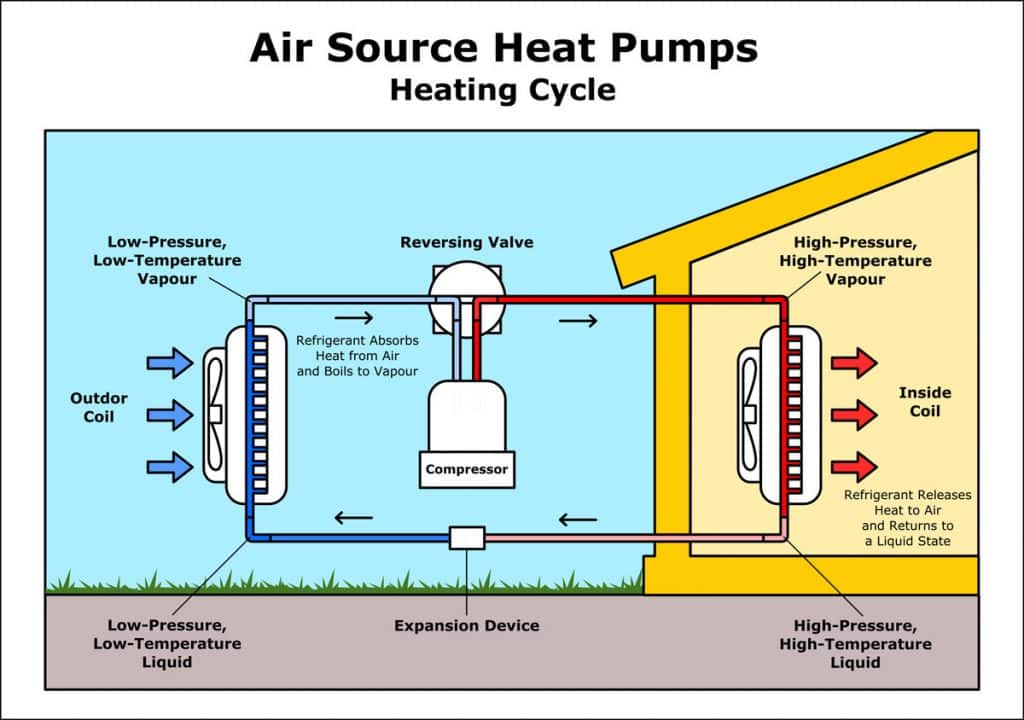
The cooling and heating processes have similar physical properties. Consequently, the liquid refrigerant absorbs heat energy into the outdoor unit, converting it into gas. The system applies pressure to the cold gas, making it hot.
Passing air then cools the hot air, and the heat released warms and condenses the gas, turning it into a warm liquid. The warm liquid is depressurized and allowed into the outdoor unit, cooling it, and the process restarts.
Factors to Consider When Choosing a Heat Pump System
Since many people consider heat pumps an efficient and pocket-friendly way to regulate the temperature within their homes, you might also want to buy one. However, it would be best to consider these vital factors before purchasing:
Compressors
When choosing a heat pump, consider one with a durable compressor and one that uses less energy. Preferably, pick one with two-speed compressors capable of conditioning air, depending on the required capacity. A two-speed compressor enables the heat pump to function effectively while using less energy. Besides, the compressor ensures that the system doesn’t stress, resulting in long-lasting equipment.
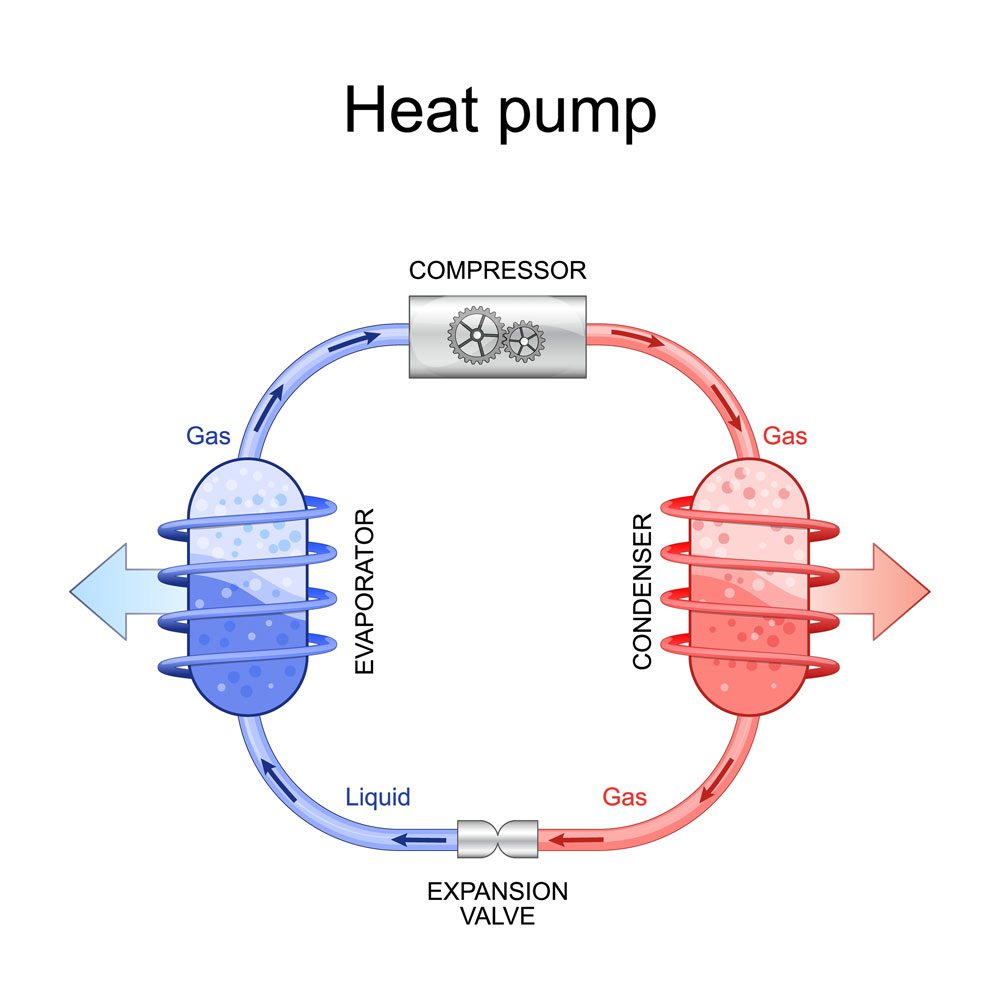
Size
The size of your heat pump determines its effectiveness and capacity to meet your requirements. In this case, consider your home size when picking a heat pump capable of conditioning the air in your entire house. For example, a 400 sq. ft. space will require a one-ton heat pump to condition the air effectively.
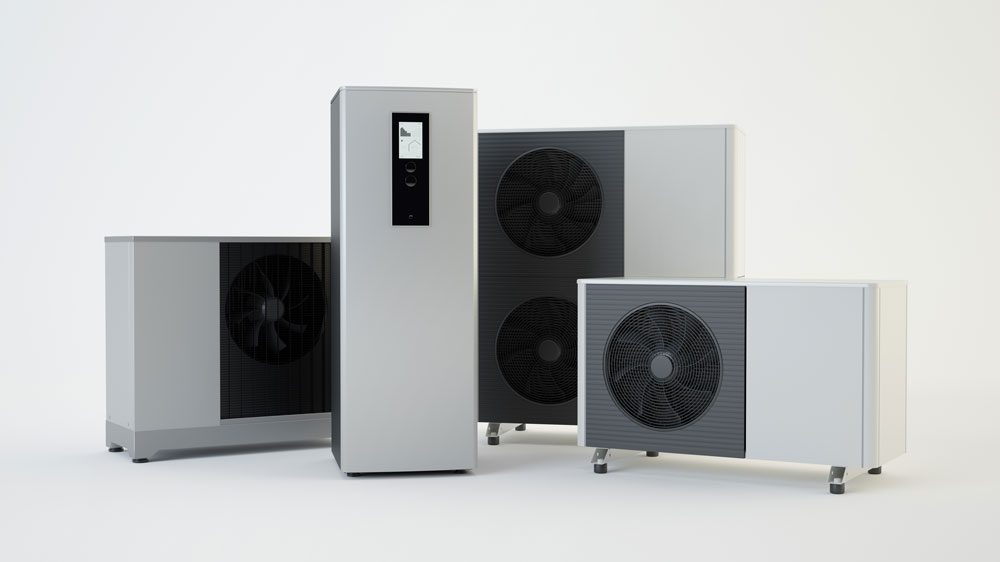
Insulation
The level of insulation throughout your house determines the size of the heat pump you need. For instance, you can use a smaller heat pump in a well-insulated home since it helps retain conditioned air for longer, unlike a poorly-insulated house. A smaller heat pump costs less and has a lower operating cost, meaning you will save some money. In addition, it reduces energy consumption, so you spend less money on power.
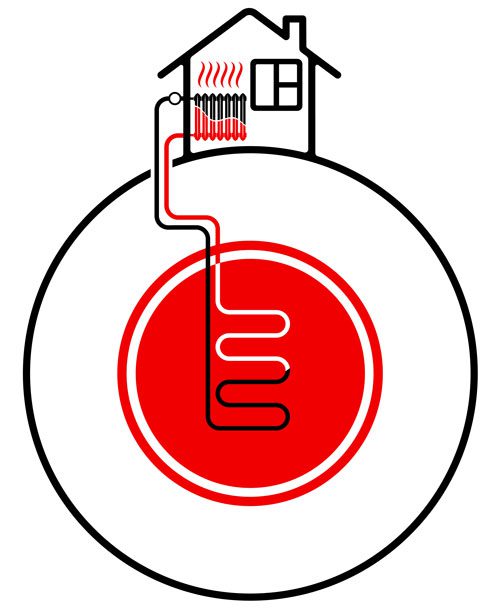
Cost
Purchasing and installing a good quality heat pump will cost you significant money. The efficiency rating on the equipment will determine how much you spend as a monthly operating cost. However, a heat pump with a higher rating might cost more when purchased, but the operating cost is cheaper. On the other hand, a cheap heat pump with a lower power rating becomes expensive in the long -run.
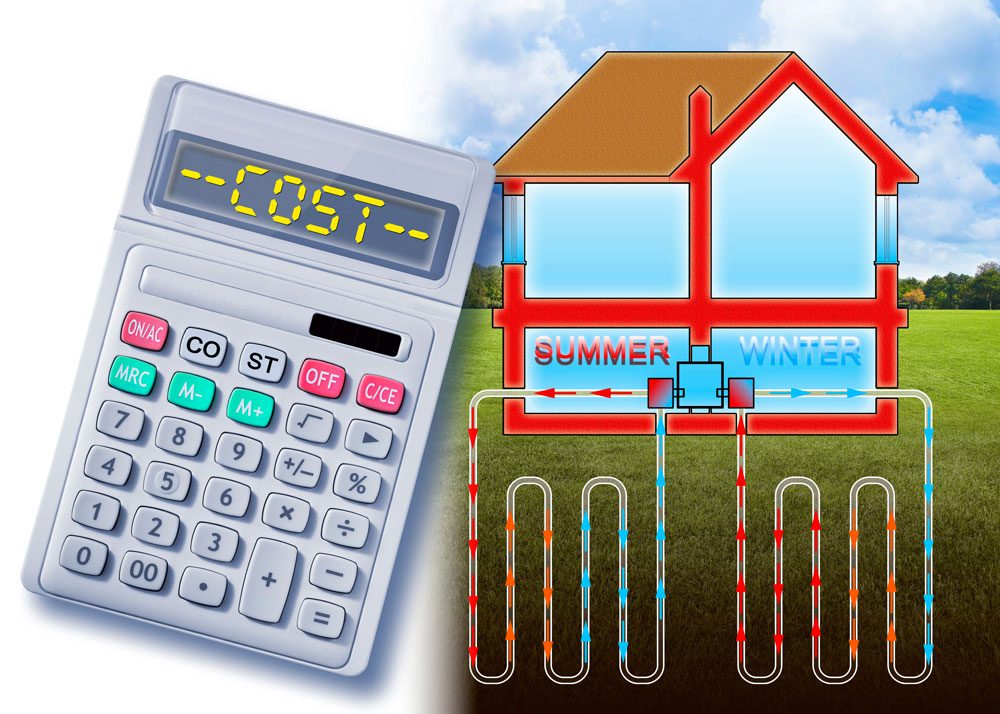
Duct System
The duct system requires proper construction to ensure that the pump operates efficiently. The duct system pumps out the air within your house, so you must ensure it is adequately insulated. In addition, let the contractor appropriately seal the system to maintain the required air temperature.
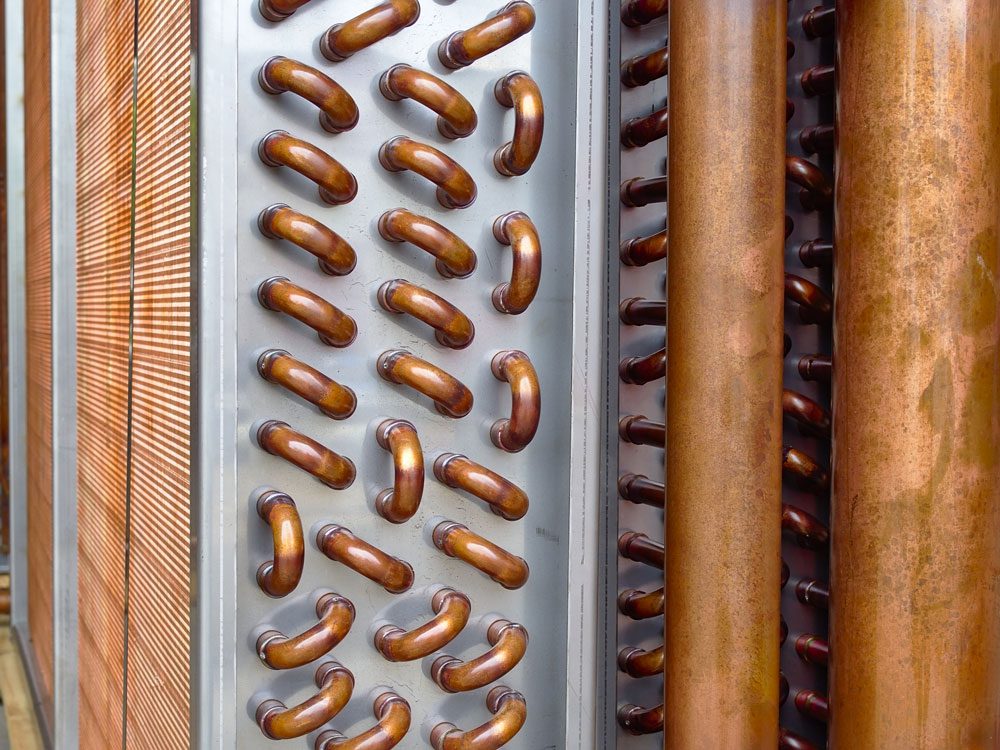
Brand Warranty
It is common for machines to malfunction after you buy them. Therefore, you need to inquire whether the heat pump you want to purchase has a warranty. The warranty allows you to return the heat pump to the manufacturer, or they will have it fixed if it breaks down.
Customer Reviews
Most companies that sell heat pumps have an official website from where you can order their products. In addition, they have a comment section where customers express their reviews on the equipment. You should read the reviews to know what to expect if you buy it. Suppose the reviews don’t give you a clear picture of the heat pump’s quality. Consider buying from a company that produces high-quality machines.
FAQ
Can I use a heat pump for AC only?
Yes, you can use a heat pump for AC only. In fact, many people do this in the summertime when they don’t need the heating function. All you have to do is set your thermostat to “cooling” mode and the heat pump will take care of the rest.
One advantage of using a heat pump for AC only is that it is very energy efficient. This is because the heat pump doesn’t have to work as hard to cool your home as it would if it were also heating it. As a result, you’ll see lower energy bills each month.
Another advantage is that heat pumps are very versatile and can be used for both heating and cooling. So, if you decide you want to use your heat pump for both functions later down the road, you won’t have any problems making the switch.
Do heat pumps work as air conditioners (air exchangers)?
Heat pumps are a type of air conditioner that use less energy than traditional models. How do they work? Heat pumps move heat from one place to another. In the summer, they move heat from your home into the outside air. In the winter, they reverse the process and move heat from the outside air into your home.
So, do heat pumps work as air conditioners? Yes! Heat pumps can be an energy-efficient way to keep your home cool in the summer.
Does a heat pump use an air handler?
A heat pump is a device that transfers heat energy from one place to another. It can be used to heat or cool a space, depending on the needs of the user. A heat pump uses an air handler to circulate air around the space. The air handler helps to evenly distribute the heat or cool air throughout the room.
Do air conditioners have heat pumps?
Air conditioners use heat pumps to help regulate the temperature in a space. The pump works by using a refrigerant to absorb heat from the air and then release it outside. This process is reversed in the winter, when the heat pump helps to warm the air.
While most air conditioners have heat pumps, some models do not. If you are unsure whether your air conditioner has a heat pump, check the manufacturer’s manual or contact a local HVAC contractor.
Does a heat pump cool as well as an air conditioner?
As summer temperatures rise, many homeowners are wondering whether a heat pump or an air conditioner will better suit their needs. While both types of units can effectively cool a home, there are some key differences to consider.
Air conditioners work by using refrigerant to remove heat and humidity from the air. This refrigerant is then circulated back into the home to continue the cooling process. Heat pumps, on the other hand, use electricity to move heat from the inside of a home to the outside.
So, which type of unit is more effective? It really depends on the specific situation. If a home is already well-insulated, a heat pump may be all that is needed to keep things cool. However, if a home tends to be hot and humid, an air conditioner may be necessary to provide adequate cooling.
Conclusion
A good heat pump goes a long way to ensure you keep your house at the desired temperature. The best thing about these air conditioning pumps is that they supply more air than other air conditioners. Besides being efficient and cost-effective, you must consider some factors to enjoy using the equipment. Ensure that the airflow capacity of your heat pump matches your ducts. If the airflow exceeds the ducting, your heat pump becomes noisy.


